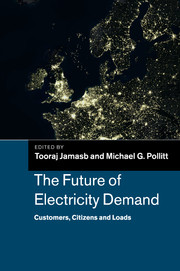Book contents
- Frontmatter
- Contents
- List of Figures
- List of Tables
- List of Boxes
- List of Contributors
- Foreword
- Preface
- Acknowledgements
- Introduction and overview of the chapters
- Part I The economics
- 1 The economics of energy (and electricity) demand
- 2 Energy scenarios and implications for future electricity demand
- 3 Demand-side participation: price constraints, technical limits and behavioural risks
- 4 Review of recent developments in economic modelling of energy demand
- Part II Technology
- Part III Social dimensions
- Part IV Policy and regulation
- Index
- References
2 - Energy scenarios and implications for future electricity demand
from Part I - The economics
Published online by Cambridge University Press: 05 March 2014
- Frontmatter
- Contents
- List of Figures
- List of Tables
- List of Boxes
- List of Contributors
- Foreword
- Preface
- Acknowledgements
- Introduction and overview of the chapters
- Part I The economics
- 1 The economics of energy (and electricity) demand
- 2 Energy scenarios and implications for future electricity demand
- 3 Demand-side participation: price constraints, technical limits and behavioural risks
- 4 Review of recent developments in economic modelling of energy demand
- Part II Technology
- Part III Social dimensions
- Part IV Policy and regulation
- Index
- References
Summary
Introduction
This chapter sets out four energy scenarios for Great Britain in 2050 that are intended, as a set, to provide insight, assist strategic planning and promote discussion on future electricity networks and the electricity system as a whole. These scenarios were originally prepared by members and associates of the SuperGen FlexNet consortium for Ofgem in the context of their Long-Term Electricity Network Scenarios (LENS) project and benefited from several rounds of stakeholder consultation, workshops and peer review (Ofgem, 2007b, c, d).
The published LENS scenarios included comprehensive narrative sections that, in two parts, described the high-level energy context for networks and then a more specific description of the role of networks and the associated network technologies. In this chapter the scenarios have been distilled from their original form to reduce the detailed focus on networks and draw out implications for electricity demand. However, no new material has been added – there has simply been a reduction in the quantity of detailed narrative. In addition, LENS included a fifth scenario (multi-purpose networks) that explored the effect of see-sawing trends. This scenario brought out interesting implications for investment in network infrastructure and technology; however, within the context of this book's objectives, and in the interests of space, it has not been included here. The four scenarios presented provide an ample set for exploring future electricity demand. Readers interested in the original set of scenarios are referred to the LENS final report (Ofgem, 2008a).
- Type
- Chapter
- Information
- The Future of Electricity DemandCustomers, Citizens and Loads, pp. 48 - 87Publisher: Cambridge University PressPrint publication year: 2011



